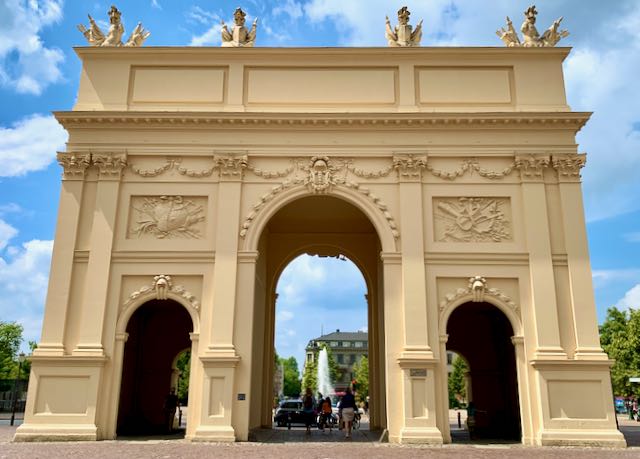Being in Relationship
 (Brandenburg Gate in Potsdam, own image)
(Brandenburg Gate in Potsdam, own image)
Being in Relationship
This last week I have spent a lot of time in relationship and thinking about relationships – the former is why this is going to be a short edition of the newsletter. I spent every afternoon and all of Thursday and Friday with my daughter, exploring our new temporary home of Potsdam. That was very rewarding. In the evenings, I participated in a series of Warm Data / People Need People Sessions, organised around the current preparation for the upcoming UN High Level Dialogue on Energy. On top of that, I started reading a new book (Bruhn and Böhme 2021) that puts relationships at the heart of the discussion around sustainability and our ability as human society to achieve a sustainable future – I had a very interesting conversation with Thomas Bruhn, one of the authors, last week.
The main thesis of Bruhn and Böhme is that the way we are in relationships with ourselves, with others, and with our environment shapes our being and how we behave – and in the end how our society lives on this planet. In particular, they highlight the importance of patters of relationship that repeat themselves in our lives. Do we mostly live in relationships that are based on utility – on ‘What’s in there for me?’ – or do we live in relationships that have an intrinsic value without the need to have an immediate benefit? The authors cite the German sociologist Hartmut Rosa who introduced the terms instrumental relationships for the former and resonant relationships for the latter type. Looking at these relationship patterns critically and shifting them carefully is, according to Bruhn and Böhme, the most important step towards a more sustainable society, which each and every one of us is able to do in a small and personal way. I’m only about a third into the book, so there might be more.
Reference: Bruhn, Thomas, and Jessica Böhme. 2021. Mehr sein, weniger brauchen: Was Nachhaltigkeit mit unseren Beziehungen zu tun hat. Beltz GmbH, Julius.
The Paper Museum
Again a German piece this week in the Paper Museum. A poem by Rainer Maria Rilke on patience. I could not find an English translation unfortunately. I used DeepL to translate it below, editing it lightly and I hope I haven’t butchered it too much.
Über die Geduld
Man muss den Dingen
die eigene, stille
ungestörte Entwicklung lassen,
die tief von innen kommt
und durch nichts gedrängt
oder beschleunigt werden kann,
alles ist austragen – und
dann gebären…
Reifen wie der Baum,
der seine Säfte nicht drängt
und getrost in den Stürmen des Frühlings steht,
ohne Angst,
dass dahinter kein Sommer
kommen könnte.
Er kommt doch!
Aber er kommt nur zu den Geduldigen,
die da sind, als ob die Ewigkeit
vor ihnen läge,
so sorglos, still und weit…
Man muss Geduld haben
Mit dem Ungelösten im Herzen,
und versuchen, die Fragen selber lieb zu haben,
wie verschlossene Stuben,
und wie Bücher, die in einer sehr fremden Sprache
geschrieben sind.
Es handelt sich darum, alles zu leben.
Wenn man die Fragen lebt,
lebt man vielleicht allmählich,
ohne es zu merken,
eines fremden Tages
in die Antworten hinein.
Rainer Maria Rilke (1875 – 1926)
On Patience
One must give things
their own, quiet
undisturbed development.
which comes deeply from within
and cannot be urged
or accelerated,
all is carrying out - and
then give birth…
To mature as the tree,
which does not urge its sap
and stands confidently in the storms of spring,
without fear,
that behind it no summer
might come.
It is coming after all!
But he comes only to the patient,
who are there as if eternity
lies before them,
so carefree, still and far…
One must have patience
with the unsolved in the heart,
and try to love the questions themselves,
like locked rooms,
and like books written in a very foreign language.
It is a question of living everything.
If one lives the questions,
one lives perhaps gradually,
without realising it,
one strange day.
into the answers.
Rainer Maria Rilke (1875 – 1926)